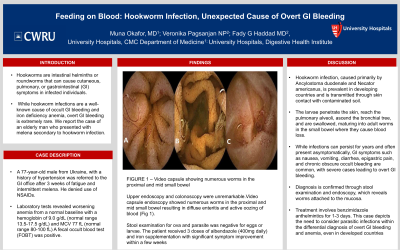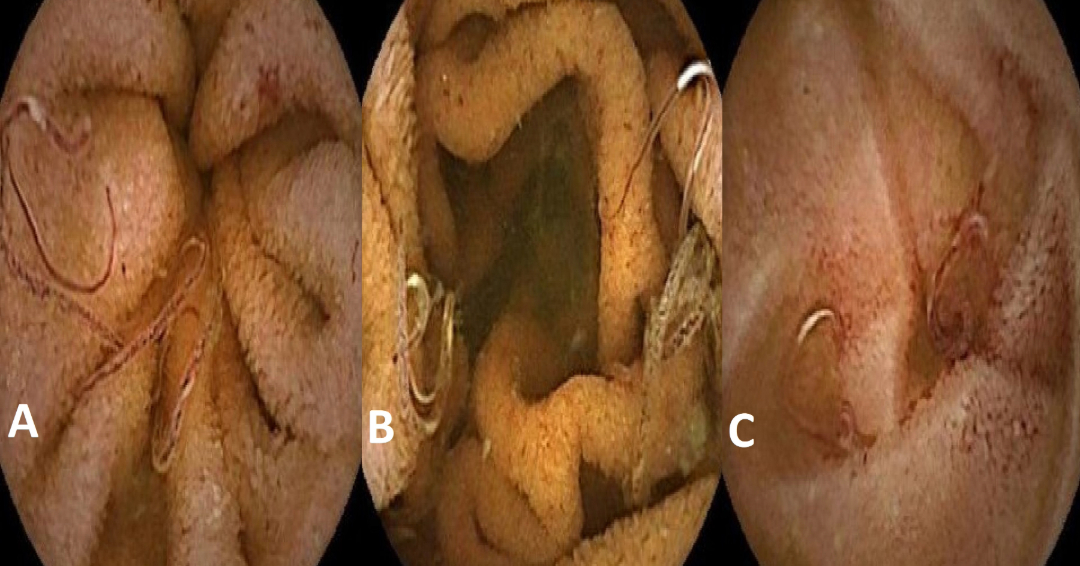Tuesday Poster Session
Category: GI Bleeding
P4220 - Feeding on Blood: Hookworm Infection an Unexpected Cause of Overt Gastrointestinal Bleeding
Tuesday, October 29, 2024
10:30 AM - 4:00 PM ET
Location: Exhibit Hall E

Has Audio
- MO
Munachimso Okafor, MD
University Hospitals Cleveland Medical Center, Case Western Reserve University
South Euclid, OH
Presenting Author(s)
Munachimso Okafor, MD1, Veronika Pagsanjan, NP2, Fady G. Haddad, MD3
1University Hospitals Cleveland Medical Center, Case Western Reserve University, South Euclid, OH; 2University Hospitals, Cleveland Medical Center, Parma, OH; 3University Hospitals Cleveland Medical Center, Parma, OH
Introduction: Hookworms are intestinal helminths or roundworms that can cause cutaneous, pulmonary, or gastrointestinal (GI) symptoms in infected individuals. While hookworm infections are a well-known cause of occult GI bleeding and iron deficiency anemia, overt GI bleeding is extremely rare. We report the case of an elderly man who presented with melena secondary to hookworm infection.
Case Description/Methods: Case Description:
A 77-year-old male from Ukraine, with a history of hypertension was referred to the GI office after 3 weeks of fatigue and intermittent melena. He denied use of NSAIDs. Laboratory tests revealed worsening anemia from a normal baseline with a hemoglobin of 9.0 g/dL (normal range 13.5-17.5 g/dL) and MCV 77 fL (normal range 80-100 fL) A fecal occult blood test (FOBT) was positive.
Findings: Upper endoscopy and colonoscopy were unremarkable. Video capsule endoscopy showed numerous worms in the proximal and mid small bowel resulting in diffuse enteritis and active oozing of blood (Fig 1). Stool examination for ova and parasite was negative for eggs or larvae. The patient received 3 doses of albendazole (400mg daily) and iron supplementation with significant symptom improvement within a few weeks
Discussion:
Hookworm infection, caused primarily by Ancylostoma duodenale and Necator americanus, is prevalent in developing countries and is transmitted through skin contact with contaminated soil. The larvae penetrate the skin, reach the pulmonary alveoli, ascend the bronchial tree, and are swallowed, maturing into adult worms in the small bowel where they cause blood loss. While infections can persist for years and often present asymptomatically, GI symptoms such as nausea, vomiting, diarrhea, epigastric pain, and chronic obscure occult bleeding are common, with severe cases leading to overt GI bleeding. Diagnosis is confirmed through stool examination and endoscopy, which reveals worms attached to the mucosa. Treatment involves benzimidazole anthelmintics for 1-3 days. This case depicts the need to consider parasitic infections within the differential diagnosis of overt GI bleeding and anemia, even in developed countries

Disclosures:
Munachimso Okafor, MD1, Veronika Pagsanjan, NP2, Fady G. Haddad, MD3. P4220 - Feeding on Blood: Hookworm Infection an Unexpected Cause of Overt Gastrointestinal Bleeding, ACG 2024 Annual Scientific Meeting Abstracts. Philadelphia, PA: American College of Gastroenterology.
1University Hospitals Cleveland Medical Center, Case Western Reserve University, South Euclid, OH; 2University Hospitals, Cleveland Medical Center, Parma, OH; 3University Hospitals Cleveland Medical Center, Parma, OH
Introduction: Hookworms are intestinal helminths or roundworms that can cause cutaneous, pulmonary, or gastrointestinal (GI) symptoms in infected individuals. While hookworm infections are a well-known cause of occult GI bleeding and iron deficiency anemia, overt GI bleeding is extremely rare. We report the case of an elderly man who presented with melena secondary to hookworm infection.
Case Description/Methods: Case Description:
A 77-year-old male from Ukraine, with a history of hypertension was referred to the GI office after 3 weeks of fatigue and intermittent melena. He denied use of NSAIDs. Laboratory tests revealed worsening anemia from a normal baseline with a hemoglobin of 9.0 g/dL (normal range 13.5-17.5 g/dL) and MCV 77 fL (normal range 80-100 fL) A fecal occult blood test (FOBT) was positive.
Findings: Upper endoscopy and colonoscopy were unremarkable. Video capsule endoscopy showed numerous worms in the proximal and mid small bowel resulting in diffuse enteritis and active oozing of blood (Fig 1). Stool examination for ova and parasite was negative for eggs or larvae. The patient received 3 doses of albendazole (400mg daily) and iron supplementation with significant symptom improvement within a few weeks
Discussion:
Hookworm infection, caused primarily by Ancylostoma duodenale and Necator americanus, is prevalent in developing countries and is transmitted through skin contact with contaminated soil. The larvae penetrate the skin, reach the pulmonary alveoli, ascend the bronchial tree, and are swallowed, maturing into adult worms in the small bowel where they cause blood loss. While infections can persist for years and often present asymptomatically, GI symptoms such as nausea, vomiting, diarrhea, epigastric pain, and chronic obscure occult bleeding are common, with severe cases leading to overt GI bleeding. Diagnosis is confirmed through stool examination and endoscopy, which reveals worms attached to the mucosa. Treatment involves benzimidazole anthelmintics for 1-3 days. This case depicts the need to consider parasitic infections within the differential diagnosis of overt GI bleeding and anemia, even in developed countries

Figure: Hookworms in the proximal and mid small bowel; diffuse enteritis and active oozing of blood
Disclosures:
Munachimso Okafor indicated no relevant financial relationships.
Veronika Pagsanjan indicated no relevant financial relationships.
Fady G. Haddad indicated no relevant financial relationships.
Munachimso Okafor, MD1, Veronika Pagsanjan, NP2, Fady G. Haddad, MD3. P4220 - Feeding on Blood: Hookworm Infection an Unexpected Cause of Overt Gastrointestinal Bleeding, ACG 2024 Annual Scientific Meeting Abstracts. Philadelphia, PA: American College of Gastroenterology.

